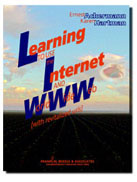| Summary Terms Exercises |
|
Chapter 3 |
|
|---|---|
Supplemental Material (available on CD included with book)
- Basic Search Strategy: The 10 Steps (Practice Activity) (PDF)
- Selected Search Engines and Meta-Search Tools on the World Wide Web (PDF)
- URLs from the chapter (HTML)
- Copies of the review questions in quiz format (PDF)
Search engines are tools that search databases created by computer programs commonly referred to as spiders or robots. These spiders comb the World Wide Web, select every single word of every Web page they find, and put all of these words in a database that the search engine then searches for us, with the help of our search request. Each of these full-text databases accesses its database differently. Even though many search engine databases attempt to cover the entire Web, none of them actually do. The Web is getting too large for any one database to index all of it. In addition to this, the same search performed in more than one database never returns the same exact results. If you want to do a thorough search, it is wise to become familiar with a few of the different search engines. To understand search engines, it is important to become familiar with the major search features, such as Boolean logic, phrase searching, truncation, and others, before you get online. It is also necessary to read each individual search engine's documentation before typing the search request in the search form. It is also a good idea to get in the habit of checking the documentation often because search engines are constantly changing their search and output features. Meta-search tools allow you to search several search engines simultaneously and can save you time if you're not sure which search engine to use.
In this chapter, we introduced the basic search strategy, a 10-step procedure
that can help you formulate search requests, submit them to search engines,
and modify the results retrieved. We have focused on the major search
engines on the World Wide Web, but several hundred smaller search engines
are also on the Web that search smaller databases. We'll discuss these
in some detail in Chapter 4, "Beyond Search Engines." In addition,
other search engines are not free to the public, but require a subscription.
Our intent in this chapter is to give you a foundation for searching any
database, no matter if it is fee-based or not, large or small. All of
the steps in the basic search strategy apply to any online database.
The information found on the World Wide Web is diverse and some of it may be offensive to some people or inappropriate for children. There are software programs that have been designed to block or filter Web sites that have certain words in them. There was a movement to force the government to control the content on the Web and the Internet. The U.S. Supreme Court ruled in 1997 that the Communications Decency Act of 1996 was unconstitutional in that it abridged the freedom of speech upheld by the First Amendment.
Using information from the Internet requires a familiarity with intellectual property issues. Much of what you find on the Internet and World Wide Web can be downloaded and distributed to others easily. Only the owners of the information can grant the right to copy or duplicate materials. This is called the copyright. In almost every case, you are required to obtain written permission from the copyright holder before distributing information on the Internet. Most copyright laws include a provision that makes it possible for individuals to copy portions of a document for short-term use. This is known as fair use.
Terms
Available on CD included with book.
This material has been prepared to accompany the book "Learning to Use the Internet and the World Wide Web" (ISBN 1-887902-78-3) by Ernest Ackermann and Karen Hartman, and published by Franklin, Beedle and Associates, Incorporated, Wilsonville, OR. © 2002. No part of this may be reproduced, stored in a retrieval system, or transcribed without permission of the publisher.
| You can help support this site by buying books, CDs, and other items after clicking on this link. |  |
Number of visits here since May 10, 2002.
